Jordan Bates • • 16 min read
12 Psychological Tactics Donald Trump Uses to Manipulate the Masses
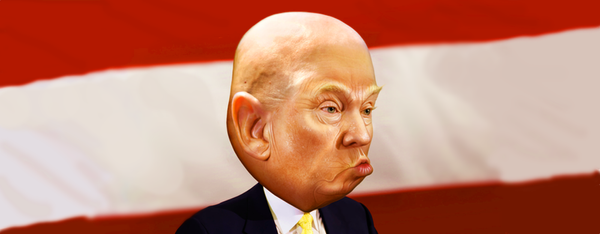
Politicians are trying to deceive you.
Modern (American) politics is essentially a game in which politicians say and do whatever they possibly can to persuade people that they are an ideal leader deserving of a vote.
But you already know that. Hopefully.
Most of us are pretty cynical about politics and straight-up expect politicians to lie to us. We understand that posturing, over-promising, tricky rhetoric, and psychological manipulation are par for the course in the political arena.
Interestingly, though, I’ve been hearing some claims regarding the current presidential race that contradict the typical cynicism with which most people view political candidates.Specifically, I’ve heard many people expressing the belief that Donald Trump and Bernie Sanders are refreshingly different from typical political candidates.
Why?
Because they say what they really feel and think, supposedly. They aren’t just talking heads. They’re real people who will let their real views and ideas be known, for better or worse.
That might be true, to some extent. Trump and Sanders might be more authentic than most politicians (which wouldn’t take much). It’s almost impossible to say.
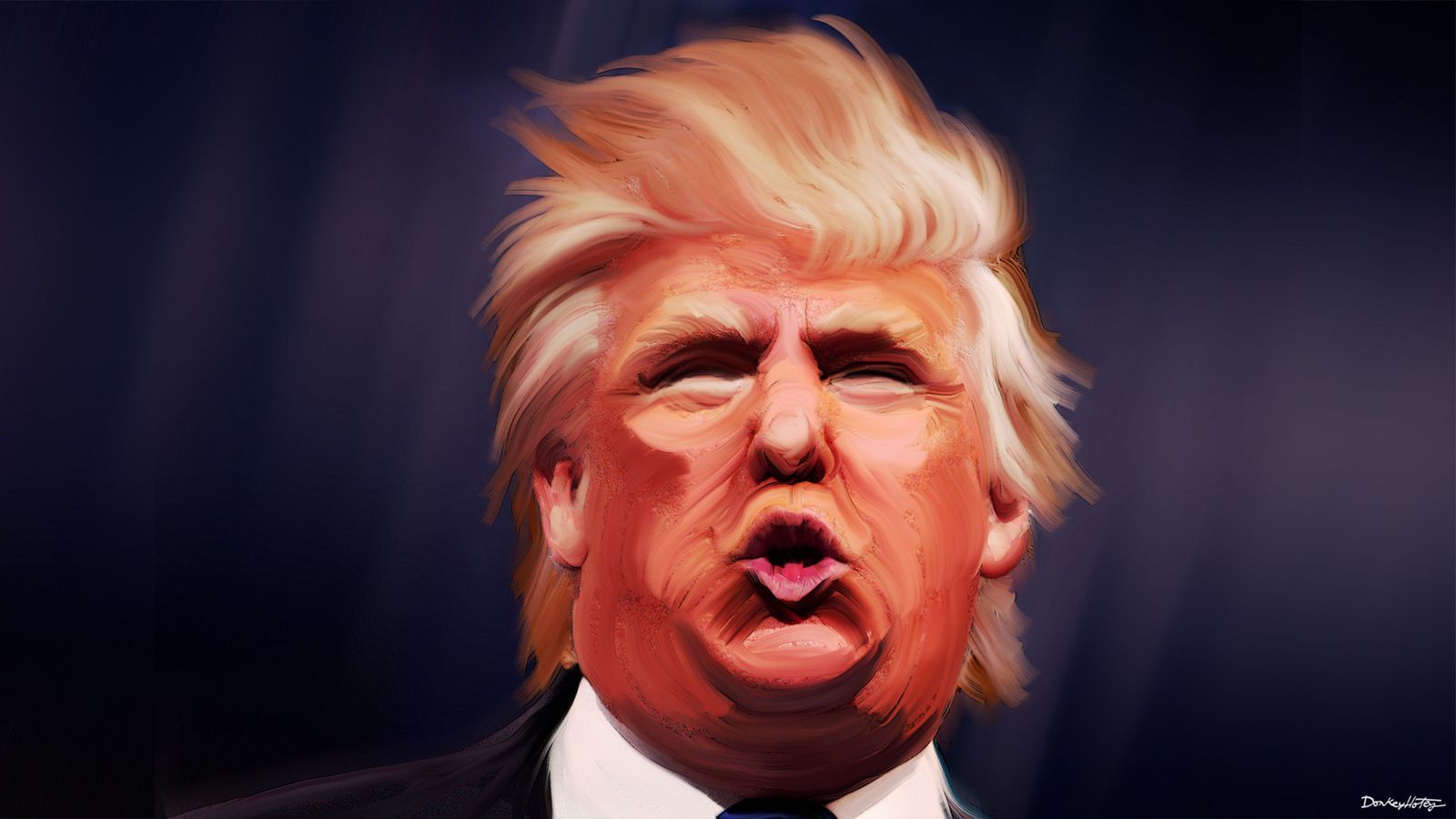
The Truth
But even if they are, make no mistake: They are still playing the game like everyone else.
I’m not saying anything about their merits as candidates or people, and I’m not making any kind of moral judgment. I’m just saying that they too are posturing, over-promising, and employing tricky rhetoric and psychological tactics to win over their audiences. Don’t think for a second that they’re not. No one would have a prayer of winning a presidential race without doing those things.
But people are viewing them as utterly genuine. People are taking them at face value.
Sanders has this effect on people because he’s so fiercely passionate about the issues. I actually believe he sincerely cares about the things he wants to change, and so he exudes an earnestness while speaking that captivates many people, especially people in my generation.
Nonetheless, I assure you that Sanders is self-aware of his grandiose, fiery style and his calls for revolution.
He knows he’s over-promising, and he’s consciously trying to create a tsunami of unrealistically high hope for a better world and ride that wave into the White House, like Obama did. It’s a good strategy, though if he gets elected, many people will probably be upset when the revolution doesn’t arrive, when the billionaire class continues to exist, and when big money continues to influence politics.¹
Trump, on the other hand, is perceived as honest because he says and does so many ludicrous things, compared to traditional candidates. Trump’s behavior is so ridiculous that people can’t fathom that most of it could be an act, a strategy, a role he’s learned to play. But it is. And whereas Bernie is trying to ride a wave of hope into the White House, Trump is trying to ride a wave of fear and anger.
Trump’s appeal is downright frightening because we are at a rather precarious moment in the history of the United States and the history of the world. The planet is filled with nuclear warheads; environmental crises are occurring/looming; the largest refugee crisis since World War II is taking place. The 21st century is a time in which the countries of the world need more than ever to cooperate with one another, consider a global perspective, and devise strategies that will make the human enterprise sustainable through the 21st century and hopefully far beyond.
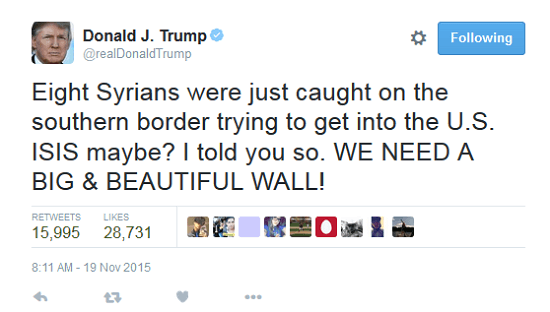
But Trump isn’t much of a cooperator. He’s explicitly stated that he wants to build a wall around much of the United States, and he’s made comments that reveal a frighteningly uncritical and violent approach to international relations (on ISIS: “I would bomb the shit out of ’em,” and “… you have to take out their families.”). From my vantage point, a leader like Trump is more likely to help bring about World War III than a more sustainable, equitable, and unified human enterprise.²
Many people don’t see it this way, though. Many believe that Trump’s aggressive and America-centric approach to politics will be our saving grace.
This may have something to do with the hypothesized psychological divide between people who lean Left versus people who lean Right. Some fascinating studies have suggested that there are neurobiological differences between liberals and conservatives. One study found, for instance, that conservatives tend to respond to threatening situations with more aggression than liberals.
If one wanted to appeal to conservative-minded people, it follows then that one could paint a picture of the world as One Giant Threat to America and propose an extremely aggressive plan to ameliorate the situation. As we’ll see, Donald Trump is a master of this persuasive tactic.
He’s a master of a number of other tactics as well, and the cumulative effect of these tactics is that he’s gone from being considered a joke candidate to having a decent chance of becoming the next leader of one of the most powerful countries in the world.
12 Psychological Tactics That Make Donald Trump a Master Manipulator
Let’s take a closer look at the various tactics Trump has used to climb into his present position. The following points were gathered primarily from two YouTube videos³ created by Charlie Houpert, which provide an excellent analysis of Trump’s various psychological strategies. You’ll find the videos embedded at the bottom of this article, if you’d like to watch them, but that isn’t necessary, as I’ll thoroughly summarize the 12 strategies they discuss.
1. Sowing Seeds of Fear
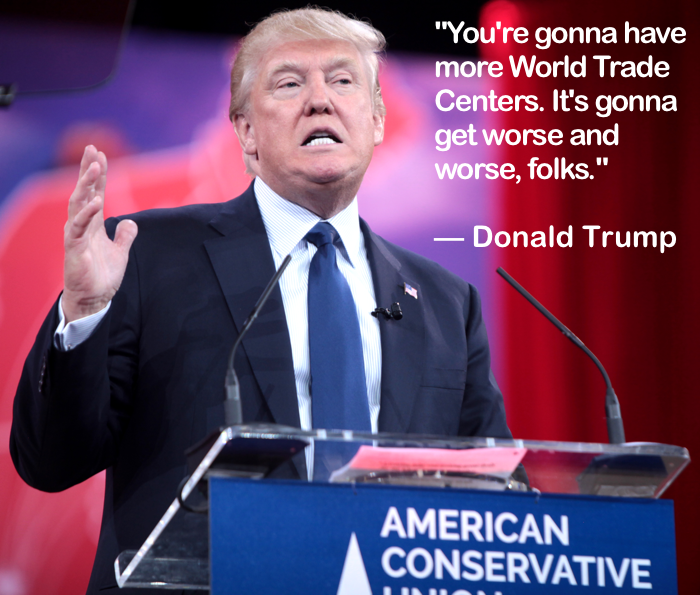
Trump has said, “You’re going to have more World Trade Centers. It’s going to get worse and worse, folks,” and “When Mexico sends its people, they’re not sending their best. They’re bringing drugs; they’re bringing crime; they’re rapists. And some, I assume, are good people.”
These are blatant instances of fear-mongering. Trump deliberately hones in on frightening statistical rarities — terrorist attacks against the US and immigrants who are dangerous rapists — and acts like they’ve become the norm. Violence has actually declined over recent decades and centuries, but Trump makes it seem like the opposite has happened.
Why does he do this? Charlie Houpert, the creator of the videos I mentioned, explains it well:
“Fear is an incredibly powerful emotion. It captures our attention like no other emotion can. We focus intensely on the thing that is giving us that fear. Secondly, it shuts down higher thinking. When we’re terrified by a bump in the night, we don’t focus on the probability that it’s just the wind. Our critical thinking skills dip as we focus solely on protecting ourselves. Thirdly, it feels crappy, so the fastest way to get out of fear and move toward a powerful emotion is to move into anger.”
Major news outlets portray the world as a terrifying place because doing so captures people’s attention. Trump is doing the same thing. Fear ensnares our attention like nothing else can, while simultaneously short-circuiting our higher cognitive functioning. This is unsettling because our natural response to fear is to escape or destroy whatever is threatening us as quickly as possible.
2. Provoking Anger and Hostility
It is quite natural for humans to cope with fear by becoming angry and aggressive. Trump fuels this fire of fear-driven rage and hostility as much as he possibly can and directs it toward non-American outgroups.
He says things like “China is taking our jobs; they’re taking our money,” and “Syrians are now being caught at the Southern border; we don’t know who they are; could be ISIS.”
He sets up false dichotomies between the interests of Americans and the interests of other humans of the world, such that if you disagree with him, you appear to be anti-American. This leaves many credulous viewers with one obvious response: to be an angry, aggressive, Trump-supporting American who views the rest of the world with suspicion and aggression!
3. Playing the Big Strong Messiah Figure
This potent combination of fear-, anger-, and aggression-mongering then sets Trump up for one of his most effective lies: that he is the only big, strong man tough enough to do what needs to be done to kick everyone else’s ass and “make America great again.”
Trump makes unrealistic claims such as “No one else will keep you safe,” and “No one is going to mess with us.” He presents himself as the most dominant and strongest-willed candidate — the only candidate capable of returning the US to its rightful position as Imminent, Dominant Global Superpower.
But again, do we need America to dominate other countries/entities at this point in history? It’s likely that some amount of military action is advisable, as certain groups (e.g. ISIS) are committing brutal crimes against innocent people.
However, if one looks at the bigger picture, it becomes clear that cooperation rather than conflict must become the rule in the human enterprise, if the human species is to persist into the deep future. On a planet now laced with nuclear warheads, unbounded aggression is no longer an option. And in a biosphere facing various environmental crises, our species must recognize the collective goal of devising sustainable systems to avert catastrophe.
But, as I mentioned earlier, research has suggested that conservative-minded people respond more aggressively to threatening situations than liberal-minded people. Instinctively aggressive people respond favorably to Trump’s call for a return to an Ultra-Dominant America.
That some people are more instinctively aggressive than others is not a “bad” thing. Clearly, this arrangement was beneficial in our primal past, or we would not have evolved this way. However, we don’t live in the world of our distant ancestors anymore. We live in a world in which excessive aggression/conflict is a potential threat to the entire biosphere and all sentient life. Thus, we need leaders who are capable of taking calculated aggressive measures after a thorough analysis of all available courses of action, not leaders whose default response to problematic circumstances is to use hyper-aggressive military force, as Trump wishes to do.
4. Painting Everything as Black and White
The world is a damn complex and ambiguous place, but admitting this reality is not a good political strategy. It’s much more effective to paint the world as a simple place where things are either X or not-X. To do so is to commit the ‘false dilemma’ fallacy. A quintessential example is a much-cited statement made by George W. Bush in 2001:
“Either you are with us, or you are with the terrorists.”
It comforts people to tell them that things must be either this or that because it makes them feel that they understand the insanely complex bramble of global affairs that no individual human actually understands en toto.
Trump is brilliant at reducing the complexity of the world to black-and-white narratives. One of his favorites is the narrative of Winners vs Losers. In Trump’s story, America has been unambiguously losing in recent memory; America is becoming a perma-loser before our eyes, and we’re just getting used to it.
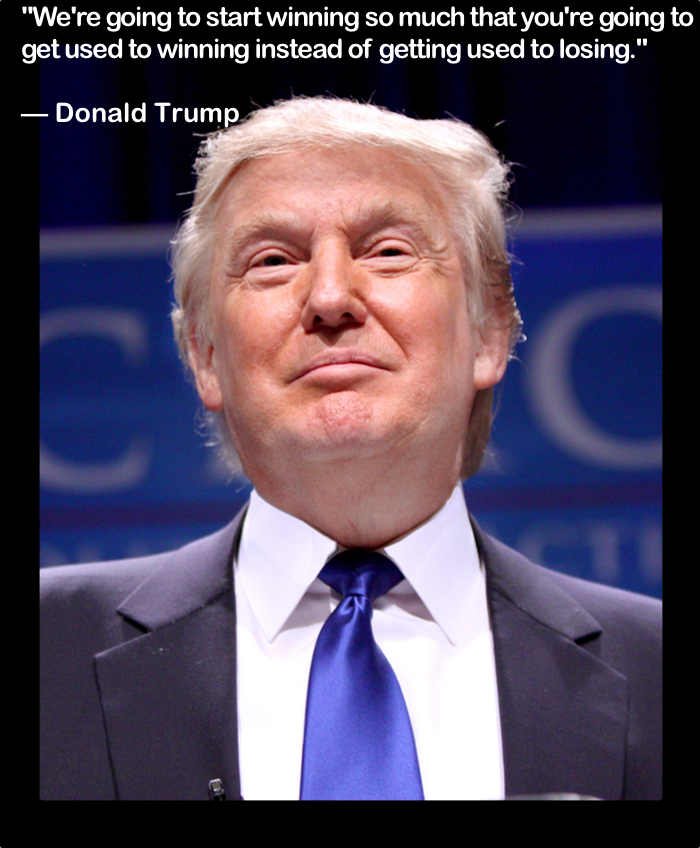
Of course, with Trump as president, America is going to start winning again in all regards. “We’re going to start winning so much that you’re going to get used to winning instead of getting used to losing,” he has said.
Does it even make sense to conceive of individual countries as “winners” or “losers” in a world where the future of our entire species and all life on Earth is potentially at stake? Probably not.
Yet Trump’s black-and-white narrative appeals to our desire for simple, digestible stories and our American hyper-competitiveness. And again, when people are afraid and angry, they are primed to accept whatever convenient narrative promises to allow them to escape their fear, and thus the absurdly vague and reductive America is Going to Start Winning So Much Again That We’ll Have Nothing to Worry About story begins to seem quite alluring indeed.
5. Deflection Via Humor
One downside of portraying yourself as the Big Strong Man is that there will still always be situations in which someone gets the best of you, making you appear foolish or weak.
Donald Trump has found himself in this situation on a number of occasions. One of the most notable was a situation in which Fox News anchor Megyn Kelly confronted Trump about past comments in which Trump had called women he disliked “fat pigs, dogs, slobs, and disgusting animals.”
This question was a potential landmine for Trump, but he interrupted Megyn Kelly halfway through her question by saying, “Only Rosie O’Donnell.” This comment caused an uproar of laughter in the audience and all but derailed the inquiry into Trump’s juvenile and dehumanizing remarks. Trump has perfected this strategy of deflecting potential threats through the use of humor. As Charlie Houpert put it:
“So that is the power of laughter. It is a pattern interrupt[ion]. You can’t stay booing and upset and angry when somebody makes you uncontrollably laugh. It also makes you more receptive to whatever comes next that somebody has to say because they’ve already started to lead you emotionally. So what Donald Trump is doing is using laughter to take control of situations where he’s starting to lose control. And what that does for him is it effectively helps him dodge any points that you make against him because he can almost erase them with a laughing crowd.“
6. Acting Superior to Opponents
Humor isn’t Trump’s only strategy for avoiding discussion of some of the more contentious issues in his record. Another favorite strategy of his is to simply act superior to all opponents and criticisms.
In one of the GOP debates, Jeb Bush attempted to point out that Donald Trump had completely changed his stance on ISIS in a matter of two months. As Jeb was saying this, Trump didn’t even pay him the courtesy of looking in his direction. Instead, he looked only at the audience with an expression of disbelief and disgust that said, “Who is this guy?”
This maneuver indicates to the audience that Bush’s attack is ridiculous, laughable, not even worthy of attention, allowing Trump to bypass any sort of rational discussion. By contrast, when Trump attacked Bush, Bush looked directly at Trump with an expression of distress and disconcertedness, playing perfectly into Trump’s game. Jeb appeared to be something of a confused and insecure novice looking to Big Daddy Trump for answers.
7. Doing Whatever Possible to Make it His Game
This point is related to the previous two, but it deserves emphasis. Trump’s power plays — whether making jokes in the face of criticism or acting superior to other candidates — are all aimed at making him appear as the leader of a game in which everyone else is merely a player.
In social dynamics, this is referred to as “frame control.” Trump frames every interaction as if he is unquestionably superior to those around him, as if everyone else is in his world. When it comes to politics, whichever politician has the strongest and most unflinching frame will make that frame a perceived reality. And Trump is very good at unflinchingly selling his frame. As a billionaire, thick-skinned businessman, he’s been practicing this tactic for decades.
Combine this with his fear-mongering, anger-mongering, and presenting himself as the One Great Strong Solution to Loser America, and you’ve got a potent combination of factors coming together to make Donald Trump appear to be an untouchable, iron-willed leader in comparison to his opponents.
Read this: George Orwell on the 7 Ways Politicians Abuse Language to Deceive You
8. Creating Double-Bind Situations
Another of Trump’s favorite tactics (and another form of frame control) is to trap other candidates in double-bind situations. Essentially, this means that he puts them in positions where it doesn’t matter what they say or how they react to him — however they respond, he will come out looking better and they will come out looking worse.
Charlie Houpert cites the example of Trump taunting Jeb Bush about having low energy during one of the GOP debates. Trump says, “I know you’re trying to build up your energy, Jeb, but it’s not working.” In the face of such a statement, Jeb Bush has two options: to try to ratchet his energy up or keep it where it is/take it down a notch. If he chooses the former, he appears to be reacting to Trump, making Trump look like he’s in control. If he chooses the latter, he remains low-energy and Trump can just steamroll him throughout the debate. It’s a lose-lose situation for Jeb Bush, and this is the power of a double-bind.
9. Repetition
Donald Trump repeats emotionally provocative words like “strong” and “win” over and over and over. The second of Charlie Houpert’s videos shows one absurd clip in which Trump manages to say the word “win” 12 times in about 15 seconds.
This tactic subtly conditions people to associate strength and victory with the Trump campaign. You might think that this tactic is silly or would only be effective on unintelligent people, but you’d be wrong. There’s a reason large companies pour millions of dollars into ad campaigns with catchy taglines and jingles: through sheer repetition, certain associations become embedded in the mind, if only on an unconscious level. Watch the documentary Century of the Self sometime if you don’t believe me.
10. Social proof
Trump loves to hammer social proof. He repeats over and over and over that he’s ahead in the polls or that people agree he won a particular debate. As social creatures, we have a distinct and sometimes malignant tendency to do and believe whatever we think everyone else is doing and believing. Trump understands the importance of this fact, and so at every turn, he acts as if he has an army of people behind him.
Trump is also very careful to avoid negative social proof. For instance, at one point Trump appeared on the O’Reilly Factor, and Bill O’Reilly suggested that people had seen Trump as a “buffoon” when he first announced his campaign. Trump outright rejected this statement, acted as if it was outrageous, and assured the audience that people did not feel that way. He was very deliberate and forceful about this because he knows that what people think other people think is one of the most potent forces driving human belief and behavior. His decades in business almost certainly ingrained that lesson into his mind.
11. Appeals to Authority
Trump loves to assert that authority figures approve of him and disapprove of other candidates. The second video of Charlie Houpert’s cites Trump saying, “Larry Kudlow likes my tax plan,” and “Experts wonder if Cruz can run the US because he was born in Canada.”
Trump understands that especially in our uncertain postmodern world with its endless sources of competing information, people look to experts to form their opinions. There is also a cognitive bias known as the Asch effect that is relevant here. From Wikipedia:
“In repeated and modified instances of the Asch conformity experiments, it was found that high-status individuals create a stronger likelihood of a subject agreeing with an obviously false conclusion, despite the subject normally being able to clearly see that the answer was incorrect.
Further, humans have been shown to feel strong emotional pressure to conform to authorities and majority positions.”
So not only do we tend to feel pressure to conform with the herd, but we also feel pressure to agree with high-status individuals.
Here’s an off-the-cuff armchair-evolutionary-psych explanation for this phenomenon: When our ancestors lived as bands of hunter-gatherers, it was beneficial to have an extraordinary level of cohesion of belief and action in a given tribe; it was often a matter of life or death. Thus, tribes in which people unquestioningly accepted the worldview passed on by wise elders and readily conformed to the herd mentality would be more likely to survive.
Anyway, for whatever reason, we’re much more likely to believe something if an authority figure or expert tells us it’s true. Trump understands this and takes advantage of it at every turn.
12. Appealing to Irrational Parts of Our Brains
This might come as a surprise, but humans actually suck at making rational decisions and are much more likely to make emotion-driven decisions. This is a great thing a lot of the time because in many areas of life, our emotions and feelings are excellent indicators of an appropriate course of action.
But when it comes to choosing the leader of one of the most powerful countries in the world, it might be a bad idea to vote for a guy because his smile gives you the warm fuzzies. Unfortunately, it’s damn difficult for humans to use rationality, especially if they haven’t been trained to think critically or haven’t researched the various cognitive biases that result in inaccurate thinking.
Donald Trump knows that most people make their decisions on the basis of emotion rather than reason. He also knows that there are certain methods of manipulating people’s emotions to get them to do what you want. Most all of the items on this list — from fear-/anger-mongering and deflection via humor to repetition, social proof, and appeal to authority — are effective methods of making people feel very confident about a position, despite the fact that they haven’t considered any statistical evidence or rational arguments.
Donald Trump understands this, and that’s why you’ll never see him engaging in a rational discussion of the issues or of the criticisms levied against him. When challenged to do so, Trump will deflect via humor, appeal to vague authorities or social proof, or utilize some sort of half-relevant anecdote to appeal to emotion and distract from his shortcomings.
In Conclusion
As I said before, Donald Trump isn’t the only one playing the manipulation game. Other candidates also understand that people are emotional creatures, and any candidate who wants to have a chance of winning must use some or all of these tactics. Such is the nature of American democracy in 2016.
What’s frightening about Trump is that he’s so damn good at playing this game. He’s spent decades learning the subtle art of being a dominant social presence and persuading people to do what he wants them to do. His actual values and ideas could be egregiously ill-conceived. Hell, they could be a recipe for World War III. But because he’s such a talented hypnotist politician, his actual values and ideas don’t matter that much. If he wins the race, it will be because he effectively encouraged and harnessed the fear, anger, and emotion-driven decision-making of a large portion of the American public.
Personally, I would prefer not to find out what happens to America after electing one of the most effective fear- and anger-mongers since, uh, Adolf Hitler. I would prefer not to find out if a man who has spent the last 30 years plastering his name on everything he could put his name on gives two shits about the interests of most Americans. I would prefer not to find out if a businessman with no political experience is prepared to approach the challenges of the presidency with wisdom and acumen. I would prefer not to find out if Trump’s hard-ass, violence-friendly approach to political problems is as dangerous for planet Earth as I think it is.
If you found this article educational or important in any way, please pass it on to your friends.
Footnotes:
1. Don’t get me wrong: I like Bernie and would likely vote for him if he were to get the nomination. All I’m saying is that he’s playing the game too, and that in reality, he had no choice but to play the game if he wanted to have any chance of winning.
2. One could also argue that an extremely passive or pacifistic US President could inadvertently cause a World-War-III situation by failing to take action to neutralize dangerous groups or leaders who are gaining power. Some argue that this is essentially what happened pre-World War II. My view is that we need leaders who are capable of taking aggressive measures after a thorough analysis of all available courses of action, not leaders whose default response to problematic circumstances is to use hyper-aggressive military force.
3. The two outstanding videos that inspired this post and provided many of the insights:

Jordan Bates
Jordan Bates is a lover of God, father, leadership coach, heart healer, writer, artist, and long-time co-creator of HighExistence. — www.jordanbates.life








